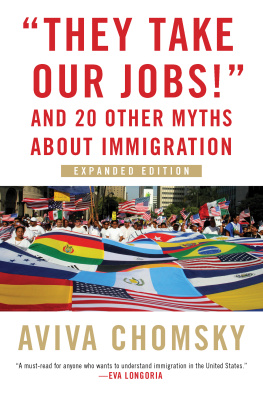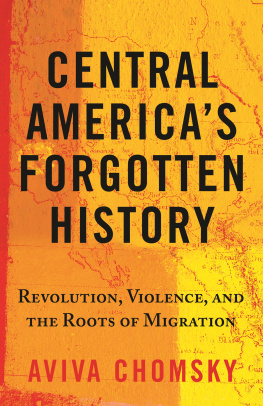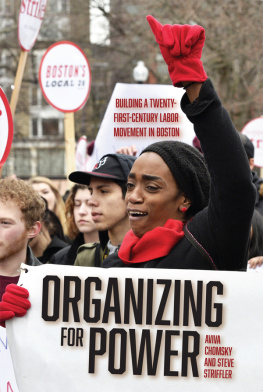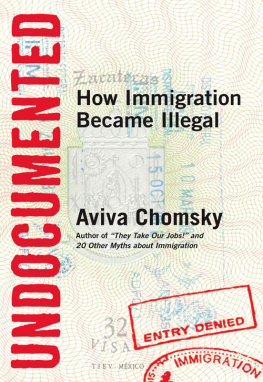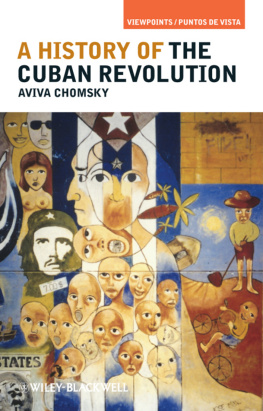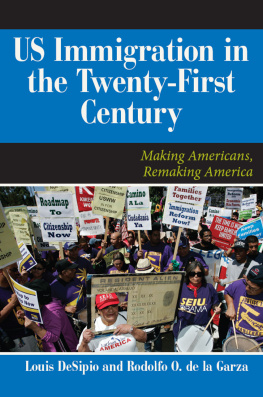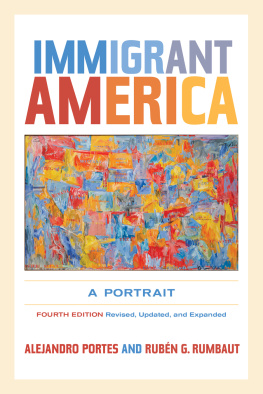Table of Contents
Pagebreaks of the print version
Guide

A NOTE ON TERMINOLOGY
Migration/immigration. Migration refers to any movement of humans (or animals) from one area to another. Immigration refers to such movements by humans when they involve crossing established state boundaries and are regulated by the governments of the territories they involve. So immigration really exists only under the modern state system.
First World/Third World. The term third world was coined in the 1950s as part of an anticolonial analysis that explained the poverty of many of the worlds regions as a legacy of their colonial past. It contrasted the situation of the former colonies to that of the first world industrialized powers, and the second world, or socialist bloc, countries.
Modernization theorists compared underdeveloped or less developed countries to developed countries, implying that development was a discrete process that all countries would go through at their own pace. Scholars from the dependency school responded that underdevelopment and development were two sides of the same coin: underdevelopment was not a starting state but rather a result of colonial exploitation. Walter Rodneys How Europe Underdeveloped Africa critiques the term and the theory behind it.
Other economists offered industrialized and non-industrialized, and later added newly industrialized or NICS (newly industrialized countries, referring usually to Singapore, South Korea, Taiwan, and Hong Kong). But the deindustrialization of the first world, and the very different nature of the industrialization now going on in the third, makes these terms problematic.
Despite the radical changes in the global economic and social order since the 1950s, the concepts of First World and Third World still offer considerable power for understanding the roots and nature of global inequality.
Latino/Hispanic. Although the terms are often used interchangeably today, they have very different histories. Most people of Latin American origin in the United States have historically identified themselves ethnically by the country they come from (i.e., as Mexican, Dominican, Colombian, etc.). During the 1960s, in the context of anticolonial revolutions abroad and African American and Native American organizing at home, a Chicano movement and a Puerto Rican or Boricua movement also emerged in the United States. These movements identified with the indigenous peoples of their homelands. Chicano referred to Mexican Americans ancestry among the Mexica indigenous people; Boricua referred to the Tano name for the island of Puerto Rico. They used the concept of internal colonialism and analyzed their historical situation in the United States as that of colonized minorities, rather than immigrants.
It was in this context that the U.S. government began to utilize the term Hispanic. To some, especially in the Southwest, it was a term that tried to depoliticize their identity, and in particular to erase the indigenous and African origins of many Latin Americans. In the Mexican North (now the U.S. Southwest), Hispanic tended to be used by Spanish-origin elites to distinguish themselves from Mexicans of African and indigenous origin, and many Chicano activists found the term offensive. On the East Coast, where Puerto Rican migrants saw their countrys resistance to Anglicization as an important part of their identity and ethnic pride, the term Hispanic tended to be taken on more readily as an acknowledgment of the importance of the Spanish language to Puerto Ricans.
Latino came into common usage in the 1980s, as an alternative to Hispanic. More Latin Americans from different parts of the continent were entering the United States, and people of Mexican and Puerto Rican origin were becoming more and more geographically dispersed throughout the country. The term Latino grew out of the same political consciousness as Chicano and Boricua, but expanded it to all Latin Americans, acknowledging the common historical experience of colonization and oppression of people of Latin American origin in the United States.
By the year 2000, though, the term Latino had lost much of its radical edge. Mainstream newspapers began to adopt it, and the 2000 census offered Hispanic or Latino as a category.
Some scholars and activists point out a further awkwardness built into the term Hispanic: because it encompasses all things (or people) related to Spain or the Spanish language, it creates a category of people that includes those from a European countrySpainand Spanish-speaking Latin America, but not people from Brazil or Haiti. It might be a logical category for studying literature (Hispanic literature), but it is not one that makes a lot of sense in looking at immigrants or ethnicity in the United States.
Undocumented/illegal. Although the terms illegal (as a noun) and illegal immigrant have been used for decades as epithets against people who supposedly lack official authorization for their presence in the United States. (I say supposedly because immigration law is quite complex, and the question of status cannot in fact be reduced to legal vs. illegal. Furthermore, those who use the term generally have no way of knowing the precise legal details regarding the immigrant they are referring to.) The terms use grew in the 1960s as overtly racist anti-Mexican terms like wetback were challenged, and they were cousins of the tough on crime approach that criminalized people of color during the Nixon administration in the 1970s and the Reagan administration in the 1980s. By the 1980s, immigrants and immigrant rights activists responded with the slogan No Human Being Is Illegal and supported the use of the term undocumented to focus attention more precisely on the lack of documents, rejecting the notion of illegality.
In 2013, the Associated Press stylebookthe standard for the news industryannounced that illegal immigrant or illegal in reference to a person was no longer an acceptable usage. AP also discouraged the use of undocumented. Following a more general move away from identifying people through a single characteristic (e.g., a schizophrenic), the stylebook recommended specifying an action, rather than labeling a person. Thus a person living in the country illegally would be preferred. But many newspapers, and even AP itself, continued to use the proscribed terms.
The concept of illegality, as discussed in of this book, received new impetus from Donald Trump, who, in addition to using the term, frequently invoked words such as rapist, gangs, and criminals when talking about immigrants. Most immigrant rights organizations continued to support the use of the term undocumented and promoted slogans like undocumented and unafraid. Young people who obtained temporary status through President Obamas DACA program sometimes referred to themselves as DACA-mented.
INTRODUCTION, 2018
Since They Take Our Jobs! was published in 2007, some things have changedboth for the better and for the worsewhile others have stayed much the same. One thing that has not changed is the prevalence of myths surrounding immigration. We still hear these same old myths recycled endlessly: Immigrants take American jobs! Immigrants dont pay taxes! The country is being overrun by illegal immigrants! If people break our laws by immigrating illegally, they are criminals and should be deported! During Donald Trumps presidential campaign and since his election and inauguration, weve actually heard them repeated with renewed vigor.

